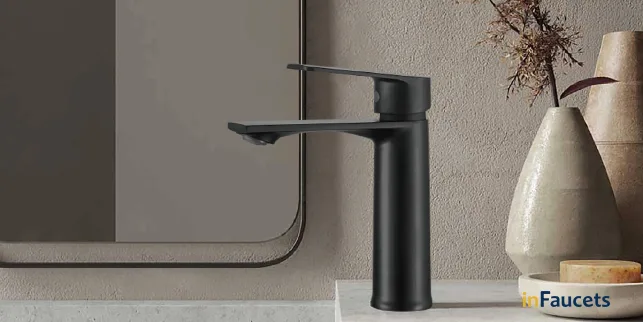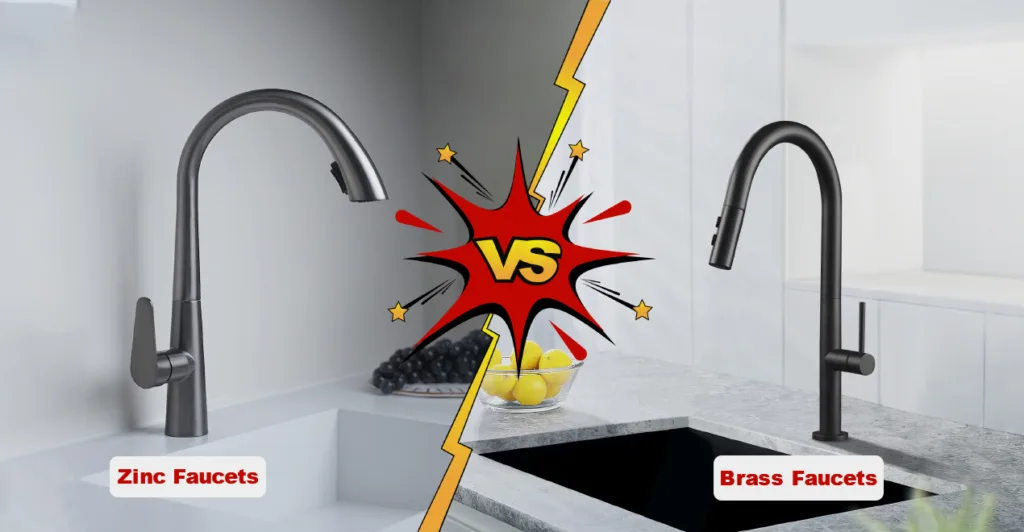Zinc vs Brass Faucets: Choosing the Right Material for Your Kitchen or Bathroom Faucets
Thoughtfully selected kitchen and bathroom faucets are essential. However, given the variety of options, it can be seemingly overwhelming, finding the best one. The type of faucets you choose can elevate your kitchen, and bathroom through raising the aesthetic appeal while meeting all your practical needs. Before buying a particular kitchen and bathroom faucet, there’s much to consider, including the type of faucet materials.
There are several materials to choose from, including Brass, copper, bronze, pewter, stainless steel, and zinc alloys. Brass and stainless steel are the most superior materials known for their corrosion resistance factor. In this article, we explore two types of faucet materials, which have distinguishing factors in terms of lifespan and durability. Let’s delve in!
Brass Faucets: Characteristics, Pros and Cons
Known for their non-corrosive element, brass faucets are the best for homeowners seeking durability and value for money. The brass faucet material can withstand wear and tear and is popularly known for its form and function. They offer remarkable convenience and, at the same time, add character to your bathroom and kitchen.
Brass materials are also in demand due to their anti-microbial properties. Solid brass construction comprises copper and zinc alloy, with Copper content ranging from 58% to 90%. Additionally, the Copper elements on Brass faucets are anti-microbial. Moreover, other components, like stainless steel faucet materials, can be added to Brass to give it a specific function.
With that said, here are some benefits of brass faucet material you should know:
Durability
Brass material is sturdy and durable, which ensures your kitchen and bathroom faucets do not undergo wear and tear. This material is the best-recommended choice for homeowners seeking to enhance their daily routines by giving the utmost surety and comfort.
Non-corrosive
Unlike stainless steel faucets, the composition of solid brass faucets doesn’t contain iron, making them corrosion-resistant. This means that they don’t rust, which enhances their quality and durability for a long time.
Low Maintenance
Brass faucets are the practical choice for an easy and efficient installation. You can easily clean an ordinary brass faucet body with a soft cloth and water, removing any stains and ensuring you don’t tamper with the finish.
Heat Resistant
Another unique feature that makes brass shower faucets among the best faucet materials is its ability to resist heat. They can efficiently pass out hot and cold water from pipes.
Several Brass Faucet Finish Options
The best part about this faucet material is that it has several finish options that suit different kitchen and bathroom styles. Homeowners are spoiled for choice, including shiny polished chrome, or they can go for a brushed nickel and the antique brass look to match your aesthetic.
Now, let’s look at its cons:
Typically, brass faucets are more expensive than other metals. Moreover, they require regular cleaning and maintenance to maintain their shiny luster, as they are often dull and can develop spots over time. In any case, this distinctive metal is the best choice for sturdiness, classic styles, and superior performance.
Zinc Faucets: Characteristics, Pros and Cons
Zinc alloy is another material that has become increasingly popular due to its affordability. And is winning many homeowners over with their unique features and appearance. They are a great alternative to solid brass faucets but must match up to Brass faucets in terms of lifespan.
Remarkably, the zinc alloys are finished with chrome or polished nickel and merged with a brass faucet. Usually, “all metals” phrase on the box describes the type of faucets acquired with Zinc alloy components. Another distinct fracture distinguishing Zinc faucets from other materials like stainless steel faucets is the weight, with zinc being lighter than other materials.
Let’s look at some of its benefits.
Budget-Friendly Options
If you’re on a budget and looking for a suitable bathroom faucet for hot and cold water flows, then the zinc faucet is the best one to go for.
Light Weight
Unlike chrome-plated brass faucets, zinc faucets have a smaller density than copper, making them lighter.
But, they are dangerous for the human body since they’re easily oxidized. Its shell can’t resist corrosion and may break once it comes into contact with water. Moreover, unlike stainless steel and brass material, its surface becomes white after grinding.
Usually, zinc alloy faucets are made through sand-casting and machine die-casting, making the interior smooth and flat.
What To Consider When Choosing the Right Material For Your Kitchen or Bathroom Faucets

Before you buy any faucets, you need to consider several factors to acquire the best material for your kitchen and bathroom faucets. Let’s look at some of them.
Durability and Lifespan
With advanced technology, faucet manufacturers can produce any fixture with any look, function, and other top-tier quality—faucets from Brass usually last longer than their counterparts, such as stainless steel faucets.
With these types, users would experience longevity with minimal leaks and repairs due to their density and resilience. Solid brass faucets can last up to 50 years if properly maintained, making it the best material for bathroom and kitchen faucets.
Here are some factors that would affect durability and lifespan.
Aesthetics and Finish Options
Faucet finishes can contribute to the overall style and offer superior protection. For instance, Brass faucets can be plated with specific finishes to enhance durability.
- Brass Finishes
You can get two types of finishes with brass faucets—polished Brass and satin brass. Polished brass finishes are famous for their non-perishability and longevity. On the other hand, satin brass is more texturized, giving the faucet a smooth, matte appearance.

- Other Finishing Options
Satin nickel and bronze finishes are also great finishing alternatives. They are scratch- and tarnish-resistant due to their molecular bonding process. On the other hand, Chrome plating finishes may show fingerprints and need to be more suitable for high-traffic areas.
Construction and Manufacturing Process
Usually, the manufacturing process involves forming, refining, and finishing processes. Let’s take a closer look at them.
- Forming Process
The manufacturing process involves shaping the metal into a rudimentary faucet. It involves processes like forging and casting.
- Refining Process
Once created into a rudimentary faucet, it undergoe
Another new manufacturing method that produces quality faucets—core and shell construction, which forms faucets. It involves separating the channels that carry water from the faucet body. The best material will undergo all these processes for efficiency.
Performance and Functionality
Basically, faucets require a valve to control and direct water flow through a tube:
Faucet Valves and Cartridges
Cartridge systems are the most reliable option, unlike compression or ball valves. Moreover, ceramic disc cartridges are the best recommendation when you’re thinking about long-term performance and durability. Faucets that contain rubber washers or multiple parts could quickly fail.
Types of Faucets
Another factor to consider is the type of faucet you intend to buy. Ball faucets usually have a single handle operated by a metal ball with slots. On the other hand, disc faucets are famous for their high quality and reliability. Additionally, compression faucets are an excellent option because of their affordability.
In Summary

While faucets are essential in the kitchen and bathroom, choosing the right one is equally important. Homeowners must consider several factors to acquire the best faucet for the job. Solid Brass is the best-recommended material for faucets due to its longevity and quality. Stainless steel comes in second, with its superb ability to resist corrosion and modern look. Chrome-plated plastic faucets and zinc alloys are less durable and are prone to mineral deposits.
Another feature to consider is hot and cold water handles for bathroom faucets; more importantly, bathroom fixtures should be selected based on durability and aesthetics. Infaucets Faucets guarantees quality indoor plumbing fixtures, offering a range of faucets, sinks, and bathtubs, among other things. Zinc-bodied faucets might not provide longevity like brass ones. However, they are great finishing in handles and areas where water pressure is not applied
Whether you are looking for traditional or contemporary designs, choosing the suitable faucet material will provide long-lasting value and satisfaction.

